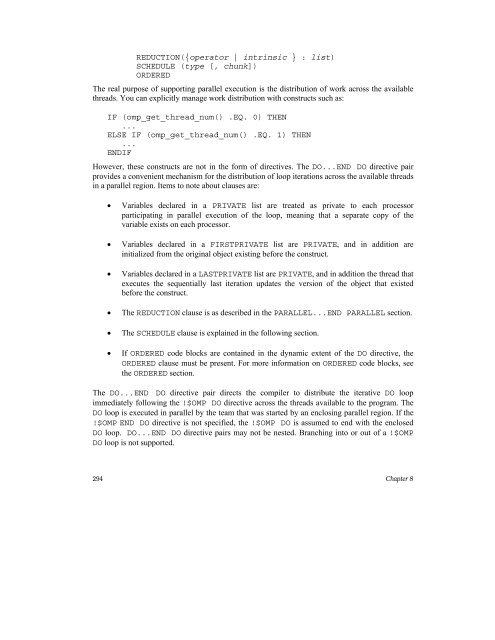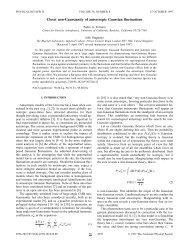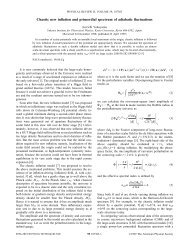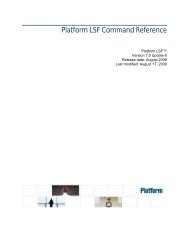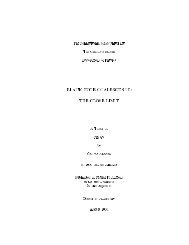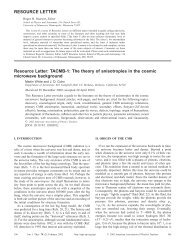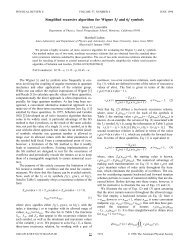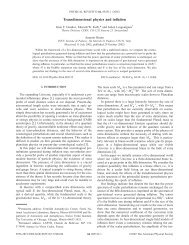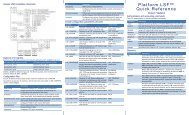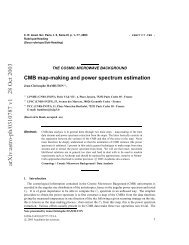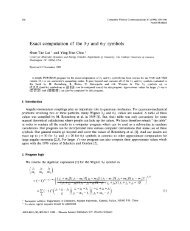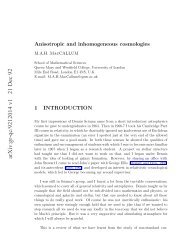- Page 2:
While every precaution has been tak
- Page 8 and 9:
Table 6-18: HPF Intrinsics and Libr
- Page 10 and 11:
• ISO/IEC 1539 : 1991, Informatio
- Page 12 and 13:
non-printing characters, such as TA
- Page 14 and 15:
1 Language OverviewThis chapter des
- Page 16 and 17:
Table 1-1: Order of StatementsOPTIO
- Page 18 and 19:
1.3 Free Form FormattingUsing free
- Page 20 and 21:
A continuation line is indicated by
- Page 22 and 23:
The following examples are invalid
- Page 24 and 25:
Operators of equal rank are evaluat
- Page 26 and 27:
1.7.3 Relational ExpressionsA relat
- Page 28 and 29:
1.9 Assignment StatementsA Fortran
- Page 30 and 31:
defined in the character expression
- Page 33 and 34:
2 Fortran Data TypesEvery Fortran e
- Page 35 and 36:
Table 2-3: Data Type ExtensionsType
- Page 37 and 38:
[s]d 1 d 2 ...d n [ _ kind-paramete
- Page 39 and 40:
2.2.5 Complex ConstantsA complex co
- Page 41 and 42:
CHARACTER(LEN=20) FIRST, LAST, MIDD
- Page 43 and 44:
2.4.4 Character SubstringA characte
- Page 45 and 46:
• A constant is always either 32
- Page 47 and 48:
STRUCTURE [/structure_name/][field_
- Page 49 and 50:
RECORD /person/ population(2), me..
- Page 51 and 52:
BYTE items(12)END MAPEND UNIONEND S
- Page 53:
declarator, modifying its value dur
- Page 56 and 57:
90/95 This statement is either new
- Page 58 and 59:
ALLOCATE 90The ALLOCATE statement i
- Page 60 and 61:
DescriptionARRAY can be used in a s
- Page 62 and 63:
ExamplesBACKSPACE 4BACKSPACE ( UNIT
- Page 64 and 65:
ExamplesCALL CRASH! no argumentsCAL
- Page 66 and 67:
Note: The data type of a symbol may
- Page 68 and 69:
HPFExampleDIMENSION R(10)COMMON /HO
- Page 70 and 71:
ALL1is an allocatable COMMON block
- Page 72 and 73:
I = I + H..END SUBROUTINE YEND SUBR
- Page 74 and 75:
DEALLOCATE 77The DEALLOCATE stateme
- Page 76 and 77:
See AlsoREAD, PRINTDIMENSION 90The
- Page 78 and 79:
DO (non-block)DO label [,] index =
- Page 80 and 81:
DOUBLE COMPLEX § 77The DOUBLE COMP
- Page 82 and 83:
SyntaxIF logical expression THENsta
- Page 84 and 85:
cfbioserrsis an integer expression
- Page 86 and 87:
For example:END FILE(20)END FILE(UN
- Page 88 and 89:
e more than one ENTRY statement wit
- Page 90 and 91:
EQUIVALENCE 77The EQUIVALENCE state
- Page 92 and 93:
extrinsic-kind-keyword is the name
- Page 94 and 95:
if no list items are specified; in
- Page 96 and 97:
argumentis a symbolic name, startin
- Page 98 and 99:
ExampleslistASSIGN 50 TO KGO TO K(5
- Page 100 and 101:
IF (Block) 77The block IF statement
- Page 102 and 103:
INCLUDE § 77The INCLUDE statement
- Page 104 and 105:
FILE= finFORM= fmfin is a character
- Page 106 and 107:
DescriptionWhen an INQUIRE by file
- Page 108 and 109:
INTEGER, INTENT(OUT)::I1I1=R1END SU
- Page 110 and 111:
SUBROUTINE TRIG (X,F,Y)Y=F(X)RETURN
- Page 112 and 113:
Manipulating data using union decla
- Page 114 and 115:
Using the -I command-line option di
- Page 116 and 117:
ERR=errsFILE= finFORM=fmcharacter d
- Page 118 and 119:
ACCESSThe value of 'APPEND' will be
- Page 120 and 121:
• Case is not significant, unless
- Page 122 and 123:
The pointer-based variable does not
- Page 124 and 125:
and is roughly equivalent tocharact
- Page 126 and 127:
.END MODULETypeNon-executableSee Al
- Page 128 and 129:
• Every item whose value is to be
- Page 130 and 131:
DescriptionYou create memory storag
- Page 132 and 133:
RETURN 77The RETURN statement cause
- Page 134 and 135:
line option). Dummy arguments, name
- Page 136 and 137:
STRUCTURE § 77The STRUCTURE statem
- Page 138 and 139:
argumentis a symbolic name, startin
- Page 140 and 141:
Syntax Derived Type DefinitionTYPE
- Page 142 and 143:
BYTE num_itemsBYTE items(12)END MAP
- Page 144 and 145:
ExamplesINTEGER SCORE(30)CHARACTER
- Page 146 and 147:
eal sumsum = 4h()accept sumand is r
- Page 148 and 149:
specified with the ":" character ra
- Page 150 and 151:
For example:SUBROUTINE YSUM1(M,B,C)
- Page 152 and 153:
4.5 CM Fortran Extensions4.5.1 The
- Page 154 and 155:
same manner. Direct access files ar
- Page 156 and 157:
Table 5-1: OPEN SpecifiersSpecifier
- Page 158 and 159:
After data is transferred, the file
- Page 160 and 161:
• Repeatable editor commands whic
- Page 162 and 163:
On output, the B field descriptor t
- Page 164 and 165:
5.5.2.8 G Format ControlThe G forma
- Page 166 and 167:
5.5.2.14 O Format Control Octal Val
- Page 168 and 169:
The X control specifies a number of
- Page 170 and 171:
5.7 List-directed formattingList-di
- Page 172 and 173:
Data TypeINTEGER*4INTEGER*8LOGICAL*
- Page 174 and 175:
• The value may be constants as a
- Page 176 and 177:
Table 6-1: Numeric FunctionsGeneric
- Page 178 and 179:
GenericNameIZEXTPurposeZero-ExtendF
- Page 180 and 181:
GenericNameREALPurposeConvert toREA
- Page 182 and 183:
GenericNamePurposeNumberof ArgsSIN
- Page 184 and 185:
GenericNameIANDPurposeLogicalANDNum
- Page 186 and 187:
Table 6-5: Fortran 90/95 Bit Manipu
- Page 188 and 189:
Table 6-8: Fortran 90/95 Array Redu
- Page 190 and 191:
Table 6-10: Fortran 90/95 Array Con
- Page 192 and 193:
Generic Name Purpose Numberof ArgsP
- Page 194 and 195:
Table 6-17: Miscellaneous Functions
- Page 196 and 197:
ArgumentsThe argument STR is the st
- Page 198 and 199:
SynopsisALLOCATED(ARRAY)ArgumentThe
- Page 200 and 201:
SynopsisASIND(X)ArgumentThe argumen
- Page 202 and 203:
ArgumentThe argument X must be of t
- Page 204 and 205:
Return ValueReturns a complex numbe
- Page 206 and 207:
COUNT 90Return the number of true e
- Page 208 and 209:
VALUES(6)VALUES(7)VALUES(8)holds th
- Page 210 and 211:
Return ValueThe dot product. For VE
- Page 212 and 213:
EXPONENT 90Return the exponent part
- Page 214 and 215:
SynopsisIAND(I, J)ArgumentsThe argu
- Page 216 and 217:
ArgumentThe arguments I and J must
- Page 218 and 219:
INT8 § 77Converts a real value to
- Page 220 and 221:
JINT § 77Converts a value to an in
- Page 222 and 223:
LEN 90Returns the length of the sup
- Page 224 and 225:
LLT 90Test the supplied strings to
- Page 226 and 227:
LSHIFT § 77Perform a logical shift
- Page 228 and 229:
If the MASK parameter is present, t
- Page 230 and 231:
MINLOC 90Return the position of the
- Page 232 and 233:
MVBITS 90Copies a bit sequence from
- Page 234 and 235:
SynopsisNULL([PTR])ArgumentsThe opt
- Page 236 and 237:
Return ValueThe return value is the
- Page 238 and 239:
SynopsisREAL(A [,KIND])ArgumentsThe
- Page 240 and 241:
ArgumentsThe argument X is of type
- Page 242 and 243:
Return ValueThe result is an array
- Page 244 and 245:
SIZE 90Returns either the total num
- Page 246 and 247: Return ValueThe return value is the
- Page 248 and 249: TRANSFER 90Return a value that has
- Page 250 and 251: VERIFY 90Verify that a character st
- Page 252 and 253: IntrinsicIALL_SUFFIXIANYIANY_PREFIX
- Page 254 and 255: Return ValueThe shifted array with
- Page 256 and 257: getloghostnmlstatputenvsymlnkttynam
- Page 258 and 259: esyndbesj0dbesj1dbesjndbesy0dbesy1d
- Page 260 and 261: Descriptionctime converts a system
- Page 262 and 263: fgetcGet character from a logical u
- Page 264 and 265: Synopsisinteger function fseek(lu,
- Page 266 and 267: Synopsisinteger function getc(ch)ch
- Page 268 and 269: Synopsisinteger function getuid()De
- Page 270 and 271: isattyIs logical unit a tty.Synopsi
- Page 272 and 273: DescriptionReturn the value which i
- Page 274 and 275: perrorPrint error message.Synopsiss
- Page 276 and 277: DescriptionThe functions rand and i
- Page 278 and 279: DescriptionReturn the index of the
- Page 280 and 281: except lstat returns information ab
- Page 282 and 283: ttynamGet name of a terminalSynopsi
- Page 284 and 285: 7.2.2 VAX/VMS System SubroutinesDAT
- Page 286 and 287: destis an integer variable or array
- Page 289 and 290: 8 OpenMP Directives for FortranThe
- Page 291 and 292: the parallel region redundantly. Th
- Page 293 and 294: In the presence of an IF clause, th
- Page 295: !$OMP SINGLE [Clauses]< Fortran cod
- Page 299 and 300: appear within a parallel region. It
- Page 301 and 302: [!$OMP SECTION]< Fortran code block
- Page 303 and 304: directive. When a common block that
- Page 305 and 306: subroutine omp_unset_lock(integer_v
- Page 307 and 308: 9 HPF DirectivesHPF directives are
- Page 309 and 310: ALIGN - REALIGNThe ALIGN directive
- Page 311 and 312: See AlsoThe TEMPLATE and PROCESSORS
- Page 313 and 314: Example!HPF$!HPF$!HPF$!HPF$REAL A(1
- Page 315 and 316: See AlsoFor details on the PROCESSO
- Page 317: TypeSpecificationSee AlsoFor detail
- Page 320 and 321: IntrinsicGLOBAL_TO_LOCALGLOBAL_UBOU
- Page 322 and 323: Return ValueIf the actual argument
- Page 324 and 325: ArgumentsARRAY may be of any type;
- Page 326 and 327: Return TypeThe result is of type de
- Page 328 and 329: ArgumentsOptional argument. PROC.AR
- Page 331 and 332: IndexABSTRACT_TO_PHYSICAL..........
- Page 333 and 334: DATA ..............................
- Page 335 and 336: GETLOG ............................
- Page 337 and 338: EXP ...............................
- Page 339 and 340: F specifier........................
- Page 341 and 342: LOCAL_UNIDEX.......................
- Page 343 and 344: OpenMP Fortran Directives .........
- Page 345 and 346: DOWHILE ...........................
- Page 347:
FMT specifier......................


